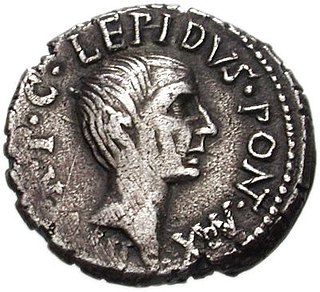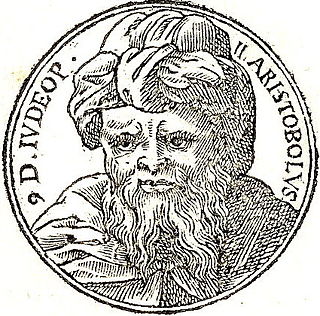Marcus Aemilius Scaurus was the son of Marcus Aemilius Scaurus (Praetor 56 BC) and Mucia Tertia, former wife of Pompey the Great. Sextus Pompey was his half brother.
Marcus Aemilius Scaurus was a Roman politician of the 1st century BC and son of Marcus Aemilius Scaurus and Caecilia Metella Dalmatica.
Mucia Tertia was a Roman matrona who lived in the 1st century BC. She was the daughter of Quintus Mucius Scaevola, the pontifex maximus, consul in 95 BC. Her mother was a Licinia that divorced her father to marry Quintus Caecilius Metellus Nepos, in a scandal mentioned by several sources. Her name, Mucia Tertia, would suggest that she was a third daughter, according to the Roman naming convention for women, though it is believed that this was instead to differentiate her from her two aunts. Mucia had also two younger half-brothers from her mother's second marriage, Q. Metellus Celer, consul in 60 BC, and of Q. Metellus Nepos, consul in 57 BC.
Sextus Pompeius Magnus Pius, in English Sextus Pompey, was a Roman general from the late Republic. He was the last focus of opposition to the Second Triumvirate. His father was Gnaeus Pompeius Magnus.
He accompanied Sextus to Asia after the defeat of his fleet in Sicily by Octavian's general Marcus Agrippa. In 35 BC, he betrayed his brother to Marcus Antonius's generals.
After the Battle of Actium he fell into the hands of Octavian but was able to escape death thanks to the intercession of his mother, Mucia.

The Battle of Actium was the decisive confrontation of the Final War of the Roman Republic, a naval engagement between Octavian and the combined forces of Mark Antony and Cleopatra on 2 September 31 BC, on the Ionian Sea near the promontory of Actium, in the Roman province of Epirus Vetus in Greece. Octavian's fleet was commanded by Marcus Vipsanius Agrippa, while Antony's fleet was supported by the power of Queen Cleopatra of Ptolemaic Egypt.
Marcus Aemilius had a son, Mamercus, who distinguished himself as a poet and orator.
Mamercus Aemilius Scaurus was a Roman rhetorician, poet and senator. Tacitus writes that Scaurus was "a man of distinguished rank and ability as an advocate, but of infamous life." He was suffect consul from July to the end of the year AD 21, with Gnaeus Tremellius as his colleague.



